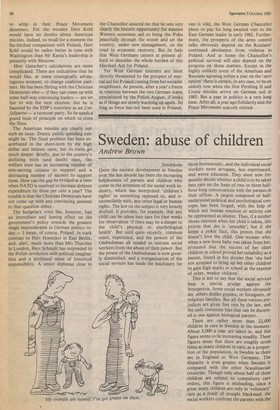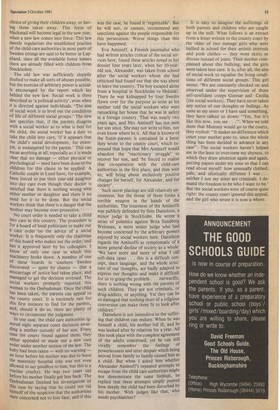Sweden: abuse of children
Andrew Brown
Stockholm Quite the nastiest development in Sweden over the last decade has been the increasing helplessness of parents and children who come to the attention of the social work industry, which has interpreted 'children's rights' as something opposed to, and irreconcilable with, any other legal or human rights. The law on the subject is very loosely drafted. It provides, for example, that any child can be taken into care for four weeks for observation 'if there may be a danger to the child's physical or psychological health'. But until quite recently, common sense, experience, and the powers of the Ombudsman all tended to restrain social workers from the abuse of their power. But the power of the Ombudsman is now greatly diminished, and a reorganisation of the social services has made the machinery far
more bureaucratic, and the individual social workers more arrogant, less experienced, and worse educated. They must now frequently decide whether a child is to be taken into care on the basis of two or three halfhour-long conversations with the parents in their offices. A jargon composed of halfunderstood political and psychological concepts has been forged, with the help of which any human emotion or activity can be represented as sinister. Thus, if a mother shows emotion when her child is taken, this proves that she is 'unstable'; but if she keeps a poker face, this proves that she doesn't love the child. One woman who, when a new-born baby was taken from her, protested that the success of her older children in school proved her suitability as a parent, found in her dossier that 'she had not scrupled to bring up her other children to gain high marks in school at the expense of other, weaker children'.
This is not to say that the social services bear a special grudge against the bourgeoisie. Some social workers obviously do; others dislike gypsies, or foreigners, or religious families. But all these various prejudices are given free rein by the law, and the only consistent bias that can be discerned is one against biological parents.
There are rather more than 22,000 children in care in Sweden at the moment. About 3,000 a year are taken in, and this figure seems to be increasing steadily. These figures mean that there are roughly seven times as many children in care, as a proportion of the population, in Sweden as there are in England or West Germany. The disparity is even greater when Sweden is compared with the other Scandinavian countries. Though only about half of these children are subject to compulsory care orders, this figure is misleading, since a great many children are only in 'voluntary' care as a result of straight blackmail: the social workers confront the parents with the choice of giving their children away, or having them taken away. This form of blackmail will become legal in the new year, when a new law comes into force. This law merely regularises the established practice of the child-care authorities in most parts of Sweden (things are said to be better in Lappland, since all the available foster homes there are already filled with children from Stockholm).
The old law was sufficiently sloppily drafted to make all sorts of abuses possible, but the exercise of arbitrary power is actually encouraged by the report which lay behind the new law. Social work is there described as 'a political activity', even when it is directed against individuals. 'The aim of social work is to level out the conditions of life of different social groups.' The new law specifies that, if the parents disagree With a social worker as to what is best for the child, the social worker has a duty to take the child into care, `if it appears that the child's social development, for examPie, is endangered by the parent.' This can mean anything at all, especially as it is made Clear that no damage — either physical or Psychological — need have been done to the Children for this clause to be applied. A Catholic couple in Lund have, for example, been forced to put their year-old daughter into day care even though their doctor is satisfied that there is nothing wrong with either mother or daughter and there is no need for it to be done. But the social workers think that there is a danger that the mother may become over-protective.
No court order is needed to take a child into care in this country. The procedure is for a board of local politicians to make out a care order on the advice of a social worker. It is frequently only the chairman Of this board who makes out the order, and has it approved later by his colleagues. I know of only one case in which this machinery broke down. A member of one Of these boards in southern Sweden discovered — quite by chance — that a miscarriage of justice had taken place, and managed to get the decision reversed. The social workers promptly reported this woman to the Ombudsman. Once the child has been taken, the parents can appeal to the county court. It is extremely rare for this first instance to find for the parents, and, should it do so, there are plenty of ways to circumvent the judgment. In one case, the child care authorities ignored eight separate court decisions awarding a mother custody of her son. Every time the courts found against them, they either appealed or made out a new care order under another section of the law. The baby had been taken — with no warning — an hour before his mother was due to leave the maternity hospital (she was not even allowed to say goodbye to him, but this is a routine cruelty). He was two years old before his mother finally got him back. The Ombudsman finished his investigation of this case by saying that he could not rid himself of the suspicion that the authorities Were concerned not to lose face, and if this was the case, he found it 'regrettable'. But he will not, or cannot, recommend any sanctions against the people responsible for this persecution. Worse things than this have happened.
Eva Aminoff, a Finnish jouirnalist who had written articles critical of the social services here, found these articles noted in her dossier four years later, when her 10-yearold son, Alexander, was taken from school after the social workers whom she had criticised had found out that she was about to leave the country. The boy escaped alone from a hospital in Stockholm to Helsinki. There he was kidnapped by four Swedes flown over for the purpose as soon as his mother told the social workers who were ransacking her house that he was in safety in a foreign country. That was nearly two years ago, and Mrs Aminoff has not seen her son since. She may not write to him, nor even know where he is. All that is known of the foster-parents is contained in a letter they wrote to the county court, which expressed that hope that Mrs Aminoff would abandon the 'reactionary struggle' to recover her son, and 'be forced to realise that co-operation with the child-care authorities in the first place, and then with us, will bring about exclusively positive changes for herself, for Alexander, and for society'.
Such secret placings are still relatively uncommon, but the threat of them forms a terrible weapon in the hands of the authorities. The treatment of the Aminoffs was publicly defended by Sten Danielson, a minor judge in Stockholm. He wrote a series of polemics against Brita Sundberg Weitman, a more senior judge who had become concerned by the arbitrary powers enjoyed by social workers here. Danielson regards the Aminoffs as symptomatic of a more general decline of society as a whole: 'We have more and more of what I call soft-data cases . . . this is a difficult concept, since language, and the whole structure of our thoughts, are badly adapted to express our thoughts and make it difficult for us to grasp the problem. . . outwardly, there is nothing wrong with the parents of such children. They are not criminals, or drug-addicts, or anything. Yet they can be so damaged that nothing short of a religious conversion can make them fit to look after children.'
Danielson is not insensitive to the suffering that children can endure. When he was himself a child, his mother fell ill, and he was looked after by relatives for a year. All this took place with the complete agreement of the adults concerned, yet he can still vividly remember the feelings . of powerlessness and utter despair which being moved from family to family caused him as a child. But when I asked him whether Alexander Aminoff's repeated attempts to escape from the child care authorities might not demonstrate the same feelings, he replied that these attempts simply proved how deeply the child had been disturbed by his mother. With judges like that, who needs psychiatrists? It is easy to imagine the sufferings of both parents and children who are caught up in the mill. What follows is an extract from a letter written to the county court by the older of two teenage girls who were bullied in school for their artistic interests and posh clothes — they wore skirts or dresses instead of jeans. Their mother complained about this bullying, and the girls were taken into care. It is, after all, the aim of social work to equalise the living conditions of different social groups. This girl wrote: 'We are constantly checked on and observed under the supervision of those self-confident creeps Gunnar and Cecilia [the social workers]. They have never taken any notice of our thoughts or feelings. As soon as my sister or I have said something, they have talked us down: "Yes, but it's like this now, you see . . .". When we told them that Mummy would go to the courts, they replied: "It makes no difference which court your mother goes to, since the whole thing has been decided in advance in any case". The social workers haven't helped me in the least to overcome my shyness, to which they draw attention again and again, putting papers under my nose so that I can read about myself: how unusually clothed, pale, and idiotically different I was . . . neither I nor my sister are criminals. I demand the freedom to be who I want to be.' But the social workers were of course quite right: the county court ignored this appeal, and the girl who wrote it is now a whore.







































 Previous page
Previous page